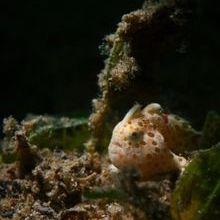The gut microbiome of deep-sea fish is a potential treasure trove for antimicrobials
26 October 2022

Down in the depths of the ocean, scientists believe they may have discovered a treasure trove. Not a sunken chest filled with gold coins and lost riches, but perhaps something even more valuable. A soon to be published study has revealed that the gut microbiomes of deep-sea fish are teeming with new antimicrobial molecules that could fight common foodborne infections. The findings shed a new light on this previously untapped resource and could one day pave the way for new antimicrobial medicines.
Historically, antimicrobial research has focused on bacteria found in soil or food, and the marine environment has remained relatively unexplored. “It's a lot more difficult to study marine bacteria, even more so for deep-sea bacteria, and it's only now that the technology is there that we can do it,” explained Shona Uniacke-Lowe, a PhD candidate at APC Microbiome Ireland and University College Cork, Ireland.
Shona’s research project focuses on “mining” the microbiomes of deep-sea fish for antimicrobials. This means searching for new molecules produced by microbes that have the ability to target other microbes. These antimicrobials could be antibiotics, or other molecules such as bacteriocins (tiny antimicrobial toxins) or enzymes. Ideally, these molecules would target a pathogen that causes disease in humans, and could thereby be utilised to develop new medicines.
“Traditionally this mining was just culturing bacteria or fungi, and testing to see if these cultures were antimicrobial – did they kill other bacteria and microorganisms?” said Shona, “Nowadays, mining is also incorporating the genomes of these microorganisms. Mining through computer software searching for genes for antibiotics or peptides or even enzymes that are quite useful for treating disease or for industry.” The study, which is not yet published, combined both approaches.
At sea on a research vessel, scientists caught various species of deep-sea fish – some from as far down as 1,000m below sea level. They took swabs from the skin and intestines and isolated any microbes present. These samples were transported to a laboratory, where Shona grew the isolates in a culture at four degrees Celsius, mirroring the same temperature as their natural habitat down in the deep sea.
To test for antimicrobial activity, Shona overlayed the samples with other test microorganisms, including common food pathogens such as Listeria and Enterococcus bacteria. If the pathogens’ growth was inhibited, this gave an indication that the deep-sea microbes were producing their own antimicrobials in response to the presence of pathogens. A remarkable 82% of the deep-sea microbe isolates showed antimicrobial activity against the test organisms used.
Of these, Shona selected a few to undergo whole genome sequencing, to get a clearer idea of what kind of antimicrobials they were producing. Shona identified 31 different genes that code for bacteriocins, as well as genes for antimicrobial enzymes and potential antibiotics.
For Shona, the results shed light on this untapped resource and pave the way for further discoveries of new antimicrobials. “There are thousands upon thousands of papers published on scientific research, but there's still such a huge chunk of the world that we don't know about,” she said, “I think for a long time scientists didn’t believe there was much to be found in the deep sea and not many experiments were done. But we're now learning there’s actually a lot to be discovered in deep-sea fish.”
Dark, cold and under immense pressure, the deep sea is a highly specialised environment that breeds highly specialised microbes. This suggests that the antimicrobial molecules they produce could be unlike anything scientists have seen elsewhere. “These molecules are potentially quite novel,” said Shona, “We’re on the cusp of something new here.”
In the future, these unique molecules could form new drugs to treat infectious diseases, which is growing increasingly urgent as pathogens become resistant to existing medicines. Shona hopes these results can provide some cause for optimism in the face of the rising tide of antimicrobial resistance: “We hear a lot about antimicrobial resistance, how it’s becoming quite a battle. The fact that there are still sources of novel antimicrobials out there definitely gives people hope.”
Shona Uniacke-Lowe will present her project at the Microbiology Society’s ‘Microbiome and mucosa-associated infectious disease: mining for antimicrobials and postbiotics with therapeutic potential’ Focused Meeting in Dublin, Ireland. Her offered talk will take place on Friday 28 October at 10:30.
Image: iStock/scubaluna.
